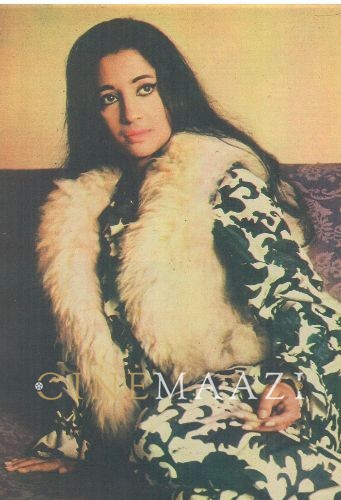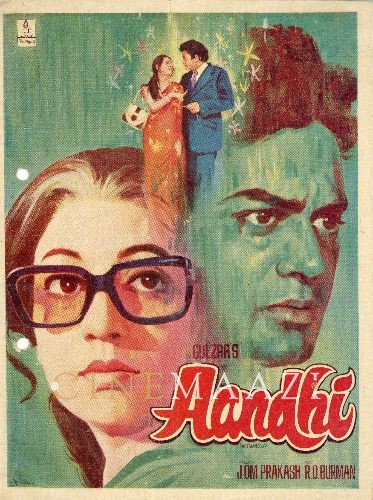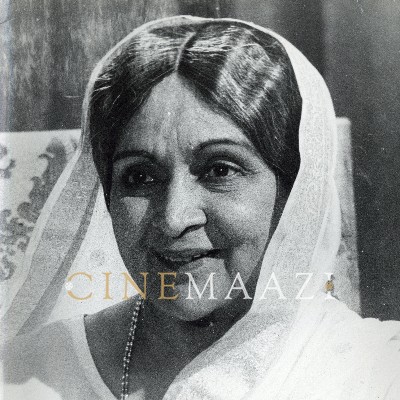Suchitra Sen

Subscribe to read full article
This section is for paid subscribers only. Our subscription is only $37/- for one full year.
You get unlimited access to all paid section and features on the website with this subscription.
Not ready for a full subscription?
You can access this article for $2 , and have it saved to your account for one year.
- Real Name: Roma Dasgupta
- Born: 6 April, 1931 (Pabna; now in Bangladesh)
- Died: 17 January, 2014 (Kolkata, West Bengal)
- Primary Cinema: Bengali
- Parents: Indira Devi and Korunamoy Dasgupta
- Spouse: Dibanath Sen
- Children: Moon Moon Sen
- Grand Children: Riya Sen (granddaughter, actress), Raima Sen (granddaughter, actress)
An enigmatic beauty, the leading and renowned actress Suchitra Sen made her mark on the Bengali screen as well as in Hindi cinema. Elegant and vibrant, she is acclaimed for a range of romantic and melodramatic performances in films such as Harano Sur (1957), Saptapadi (1961), Saat Pake Bandha (1963), Sharey Chuattor (1953), Uttar Falguni (1963), Devdas (1955), Chaowa-Pawa (1959), Debi Chowdhurani (1974), Datta (1976), Deep Jweley Jaai (1959), Alo Amar Alo (1971), Agni Parikshya (1954), and Aandhi (1975). Making her official debut with Sukumar Dasgupta's Satnambar Kayedi in 1953, she achieved stardom in Bhagaban Shrikrishna Chaitanya (1953). There was no looking back. Known for her heroine-oriented films, her image made for an interesting mix of tradition and modernity. Winning the Silver Prize for Best Actress for Saat Pake Bandha at the Moscow International Film Festival, in 1972 she was awarded the Padma Shri. Post 1979, she retreated from the public eye and lived a reclusive life, even declining India’s highest cinematic award – the Dadasaheb Phalke Award, as it would mean stepping into the limelight. In 2012, she was conferred the Banga Bibhushan – the West Bengal government's highest honour.
Born Roma Dasgupta on 6 April, 1931, in Pabna district which is currently in Bangladesh, her family migrated to West Bengal after Partition in 1947. The same year, she wed Dibanath Sen, son of a famous industrialist, Adinath Sen. Encouraged by her husband to pursue her talent for acting, she was introduced to noted filmmaker Sukumar Dasgupta. After a formal screen test, she made her debut in his directorial Satnambar Kayedi. She was also rechristened Suchitra by one of Dasgupta’s assistants, which was to remain the name she was known by in cinema. It was the start of a long and rich career in films. She was quickly signed on for films like Kajari (1953), Sharey Chuattar (1953) and Bhagaban Srikrishna Chaitanya (1953). Becoming a mother the following year to her only child - Moon Moon Sen, she managed both personal and professional life with elan.
It was her comedy Sharey Chuattar that marked the turning point in her career. Directed by Nirmal Dey, it featured Uttam Kumar in his debut onscreen. Their pairing onscreen was to become immensely popular over the next two decades; she would star opposite Kumar in 30 of the approximately 60 films she was to feature in. Appearing together in films such as Saptapadi (1961), Shilpi (1956), Har Mana Har (1972), Indrani (1958), Chaowa-Pawa (1959), Shap Mochan (1955) and Surya Toran (1958), their memorable and iconic pairing brought in audiences in droves, with endless queues lining up for advance tickets outside cinema halls in the 1950s and 1960s. Regarded as one of the most successful on-screen partnerships in Indian cinema, it also set a benchmark in the history of Bengali cinema.
Making strides for her performances, she won her first international success in 1963, bagging the Best Actress award for Saat Pake Bandha at the Moscow International Film Festival. She became the first Indian actress to have earned this honour. Cast opposite another legendary performer - Soumitra Chatterjee, the film revolved around the challenges of a young wife who is torn between her idealistic husband and her rich, dominating mother. Another noteworthy performance came in the record-making film Uttar Falguni (1963), in which she essayed a double role of courtesan Pannabai and her barrister daughter Suparna.
Interestingly, she essayed a career woman in many of her films, which lent her an agency that most actresses of her time lacked. Deep Jwele Jai (1959), often considered to be her finest performance, saw her essay a psychiatric nurse in a mental hospital, who falls in love with a patient and slowly loses her own sanity. The powerful climax of the film is regarded as one of the most celebrated sequences in popular Bengali cinema.
Saptapadi (1961) saw her play an Anglo-Indian medical student who becomes a nurse with the Red Cross. The graph sees her go from feisty and snobbish college student to an alcoholic wreck.
Stepping into the Hindi film industry, she made her debut in Bimal Roy’s blockbuster Devdas (1955), sharing the screen with megstars Dilip Kumar and Vyjayantimala. She shone again in Bombai Ka Babu (1960) opposite Dev Anand. Her most memorable performance in Hindi films would have to be Gulzar’s Aandhi, which depicted the dilemma between the personal and professional life of a politician. The film created waves for bearing a strong resemblance to the life and career of India’s then PM, Indira Gandhi. She was a class act as the ambitious Aarti, who prioritises her political career over her family. Gulzar would reveal that she never used glycerine for a scene that required her to weep. All she would ask was for the two lines of the song Tere bina zindagi se to be played. Listening to the lines ‘Tum jo kah do toh aaj ki raat chand dubega nahi, raat ko rok lo…’ would trigger the tears. Her sensitive performance also won her a Best Actress nomination. In 1972, she was conferred with the prestigious Padmashree award.
Choosing to remain within the framework of popular cinema, she is said to have declined an offer from the renowned Satyajit Ray as it required her to block her dates and not shoot for any other film while it was being made. It is also said that she refused a film offer from the famous Raj Kapoor as she wasn’t impressed by his flamboyant style of kneeling on the floor with a bouquet in his hand!
On the personal front, she and her husband had apparently drifted apart after her enormous success. He passed away in a car accident in the US in November 1969. After the dismal failure of her film Pranoy Pasha (1978), she retired from cinema and retreated from all public appearances. This sparked the famous comparison with Hollywood’s reclusive star Greta Garbo. Later, so strong was her self-imposed oblivion, that she even declined the prestigious Dadasaheb Phalke Award. Leaving her film days well behind, she became associated with the Ramakrishna Mission.
Suchitra Sen passed away on 17 January, 2014. Her legacy was astutely summarised by a film critic, who wrote, “Suchitra Sen redefined stardom in a way that few actors have done, combining understated sensuality, feminine charm and emotive force and a no-nonsense gravitas to carve out a persona that has never been matched, let alone surpassed in Indian cinema.” A phenomenon that defies description, her legend and enigma endure in the popular imagination.
-
Filmography (57)
SortRole
-
Pronoy Pasha 1978
-
Datta 1976
-
Priyo Bandhabi 1975
-

Aandhi 1975
-
Debi Choudhurani 1974
-
Sraban Sandhya 1974
-
Alo Amar Alo 1972
-
Haar Mana Haar 1972
-
Fariyaad 1971
-
Nebaraag 1971
-
Megh Kalo 1970
-
Kamallata 1969
-










.jpg)



